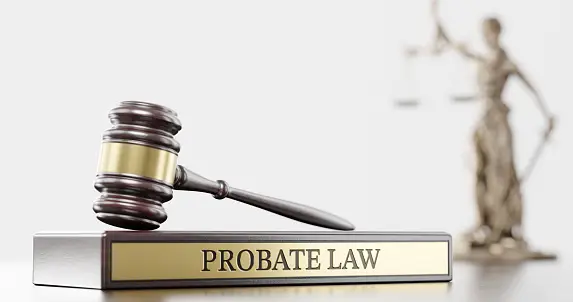The probate process is a crucial legal procedure following an individual’s death. It serves several important purposes in managing and distributing their estate. Firstly, probate involves verifying the authenticity of the deceased person’s last will and testament if one exists. This step is essential to ensure that the document accurately reflects the individual’s final wishes regarding the distribution of their assets, property, and belongings.
Secondly, during probate, the court oversees the appointment of an executor or personal representative named in the will or appointed by the court if there’s no will. This person is responsible for managing the deceased person’s affairs, including identifying and evaluating assets, paying debts, and handling tax matters. One of the primary goals of the probate process is to settle any outstanding debts and obligations of the deceased. This includes paying off creditors, covering funeral expenses, and addressing other financial claims.
Once all debts and expenses have been settled, the remaining assets are distributed to the beneficiaries or heirs named in the will. If there is no will or the will is deemed invalid, state laws, known as intestacy laws, dictate how the assets are distributed among surviving family members. Probate also provides a mechanism for resolving disputes or challenges to the will’s validity. If someone believes the will is fraudulent, the deceased was not of sound mind when creating it, or for other legal reasons, they can contest the will in court.

In summary, probate is a comprehensive legal process that ensures the orderly distribution of a deceased person’s assets, the settlement of their debts, and the resolution of any disputes or concerns related to their estate. It plays a crucial role in safeguarding the wishes of the deceased and protecting the interests of their heirs and creditors.
The Typical Probate Process
The typical probate process involves several stages and steps, which may vary depending on the jurisdiction’s specific laws and regulations. Here’s a general overview of the typical probate process:
Filing the Petition:
The process begins with filing a petition in the probate court. This is typically done by the executor named in the deceased person’s will or by an interested party if there’s no will. The petition initiates the probate proceedings.
Notification to Heirs and Beneficiaries:
Once the petition is filed, the court will notify all interested parties, including heirs, beneficiaries, and creditors. This notification may involve publishing a notice in a local newspaper and sending formal notices to known individuals.
Appointment of Executor or Administrator:
If there is a valid will, the court will officially appoint the executor named in the will. If there’s no will or no nominated executor, the court will appoint an administrator to oversee the estate.
Inventory and Appraisal:
The executor or administrator is responsible for identifying, valuing, and cataloging all assets and property the deceased owns, including real estate, personal property, bank accounts, and investments.
Notification of Creditors:
Creditors are given a specific period to file claims against the estate for any outstanding debts or bills the deceased owes. The executor reviews and evaluates these claims, and legitimate debts are paid from the estate’s assets.
Payment of Taxes:
Estate, income, and other applicable taxes must be settled. The executor prepares and files the necessary tax returns and ensures that any taxes owed are paid from the estate.
Distribution of Assets:
After debts, taxes, and administrative expenses are paid, the remaining assets are distributed according to the terms of the will or state laws if there is no will. This involves transferring property titles and assets to beneficiaries or heirs.
Final Accounting:
The executor provides a final accounting to the court, detailing all financial transactions and distributions made during the probate process. This accounting is subject to court approval.
Closing the Estate:
Once the court is satisfied that all matters have been properly addressed, the estate is closed, and the executor or administrator is discharged.

Distribution of Remaining Assets:
Any remaining assets not specifically addressed in the will or intestacy laws are distributed to the appropriate heirs or beneficiaries.
Final Report and Release:
The court issues a final report, and all interested parties receive a final release from any future claims against the estate.
It’s important to note that the probate process can be lengthy and costly. It may vary in complexity based on the size of the estate and the presence of any disputes or legal challenges. Many individuals seek legal counsel to navigate the probate process effectively.
How Long Does Probate Take In Texas?
The duration of the probate process in Texas can vary widely depending on various factors, making it a complex and sometimes lengthy procedure. Here’s a more detailed and comprehensive breakdown of what influences the timeline for probate in Texas:
Independent Administration:
In Texas, many probate cases can be handled through “independent administration,” a more streamlined process. With independent administration, the executor or administrator can act without court approval for each step, which typically speeds up the process.
Dependent Administration:
The process may take longer if the estate requires “dependent administration” due to specific circumstances, such as disputes or complexities. Court supervision involves independent administration, and this can extend the timeline.
Minimum Period:
Texas law mandates that executors wait at least six months before closing a probate case. The waiting period begins when the executor assumes their role. During this time, creditors can file claims against the estate.
Inventory and Appraisal:

The executor must complete an inventory and appraisal of the estate’s assets, which can take some time, depending on their complexity.
Creditor Claims:
Creditors have a specific window to submit claims against the estate. This period and the earlier waiting period can add several months to the probate process.
Disputes and Challenges:
Any disputes or challenges to the estate’s will or administration can significantly prolong the probate process. Resolving these issues through litigation can take additional months or even years.
Complex Assets:
If the estate includes complex assets, such as business interests, real estate in multiple states, or substantial investments, it may take longer to properly identify, value, and distribute these assets.
Efficiency of the Executor:
The efficiency and diligence of the executor or administrator can also impact the timeline. A proactive and organized executor can help move the probate process along more swiftly.
Factors Affecting the Timeline
Several factors can influence the duration of the probate process in Texas:
- Complexity of the Estate: Larger estates with numerous assets or complicated financial structures require more time to manage and distribute.
- Disputes Among Heirs: Legal disputes can significantly delay the process.
- Creditor Claims: Handling and resolving claims from creditors can add time to the process.
- Court Availability: The probate court’s schedule and workload can affect the timeline.
To summarize, many factors influence the probate process in Texas, which can last from several months to a year or more. Each estate is unique, and the specifics of the case, including the type of administration, creditor claims, disputes, and the efficiency of the executor, all contribute to the timeline. To get a more accurate estimate for a specific estate, consulting with an experienced probate attorney in Texas is advisable. They can provide guidance based on the unique circumstances of the case and any recent developments in probate law.


